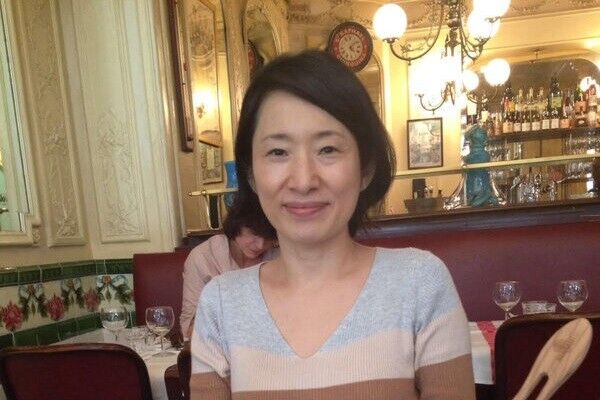Japanese Home Tutor
Japanese Tutor CHIAKI

Japanese Teacher CHIAKI
Native Language Japanese
Japanese Teaching Experiences 4 Years
Language Ability Japanese, Fluent in English and some Cantonese
Born Kagawa – Japan
Teaching Area TST, Kowloon Station, Tai Wai, Hung Hom, Mongkok, Wu Kai Sha, Jordan, Shatin, Taikoo etc
Teaching Japanese Japanese, English, Some Cantonese
Japanese Courses Provided by Chiaki
Japanese Home Tutor
Hello, my name is Chiaki, from Shikoku Japan. I’m married to a native of Hong Kong and live in Shatin. We have a son who’s been educated in local schools. He successfully passed JLPT/ N1, when he was 16, and A score in DSE Japanese, all by my home lessons. I love teaching and seeing my students’ develop and celebrate any small progress that they make.
My motto is pulling each student’ s goodness, as I believe interest is the power to create more motivation in learning. I am good at storytelling and enjoy playing with puppets, making games, etc. I am looking forward to assisting the Japanese study for those who have Japanese partner and their children. If you’re just fond of trip or shopping in Japan, I would be very happy to teach not only language but our culture!
はじめまして。四国出身の日本語講師チアキと申します。香港沙田に香港人の主人と息子と住んでいます。日本語レッスンは英語と簡単な広東語でできます。教えることが好きで、皆さんの日本語力が上達することが自分のことのように嬉しいです。
私は生徒の興味をより多く引き出すことをモットーとしています。息子は幼稚園から大学までローカル校教育を受けましたが、家庭のみの日本語教育で16歳の時にN1合格、DSE日本語もA成績を修めることができました。絵本、かるた、紙芝居、ゲームなどから始まり、小学生時代100ページ以上の本も一緒に読んだりお話しを作ったりしたものです。先生としてその生徒の持つ目標に向かってもっと楽しいやり方を見つけてあげることを心がけております。配偶者が日本人の方の日本語学習、またそのお子様の日本語教育をお手伝いいたします。また、日本のお買い物や旅行好きな方、日本の文化とともにお教えします。
Japanese Teaching Approach
I will follow the Japanese learning textbook the student decide, if it is not enough, I will prepare the teaching materials for the students.
生徒が自分で選んだ教材から初めて補足は私が作成したいと思います。
Ask CHIAKI Teacher Japanese Learning Questions
CHIAKI先生へ「そうでしたね」と「そうでしたか」の違いについて教えていただけないでしょうか?
CHIAKI先生’s Answer:
「そうでしたね」はすでに知っていた事を思い出した、再確認したときに使う相づち
「そうでしたか」は自分が知らなかった事や事情を理解したときに使う相づち
CHIAKI先生へ「本当」と「まじ」の違いについて教えていただけないでしょうか?
CHIAKI先生’s Answer:
「本当」事実という標準語
「まじ」真実、真面目という意味の俗語、スラング
CHIAKI先生へ 「さよなら」と「バイバイ」と「じゃあね」と「失礼します」と「失礼しました」の違いについて説明してくれませんか?
CHIAKI先生’s Answer:
全て別れの時に使うあいさつです。
「さようなら」は標準的な言い方で丁寧ではあるが、ビジネスシーンで使われることは少ないです。
「バイバイ」「じゃあね」はとてもカジュアルな言い方で、身内以外の目上の人に使われることはほぼないです。
「失礼します」はその場を離れる時だけでなく、入室する時にも使われます。
「失礼しました」は退室する時だけでなく、誤えた時にも使われます。
Ask CHIAKI Teacher Japanese Culture Questions
日本文化は「信用第一」と「思いやり」の文化です。おそらくそれは日本という国が島国、地震の多い国だからでしょう。海に囲まれた狭いところで今日あった人に親切にしておけばいつかまためぐり合うことになって助けてもらうことになることになるかもしれない。ですからその場の利益よりも、信用さえあれば、未来どんな縁が結ばれるかもしれないと考える文化なのです。
Today I am going to talk about Japanese culture, which is “Trust” and “Consideration”. Perhaps that is because Japan is an island country and a country with many earthquakes. If you are kind to the people you meet today in a small society surrounded by the sea, in a future you may meet each other and get help from the people you meet. Therefore, it is a culture that thinks what kind of connection may be made in the future if there is trust rather than get the benefit from the others.
The other private Japanese teacher you may feel interested



Stay in Touch
RSS
Facebook
Twitter
Google +1